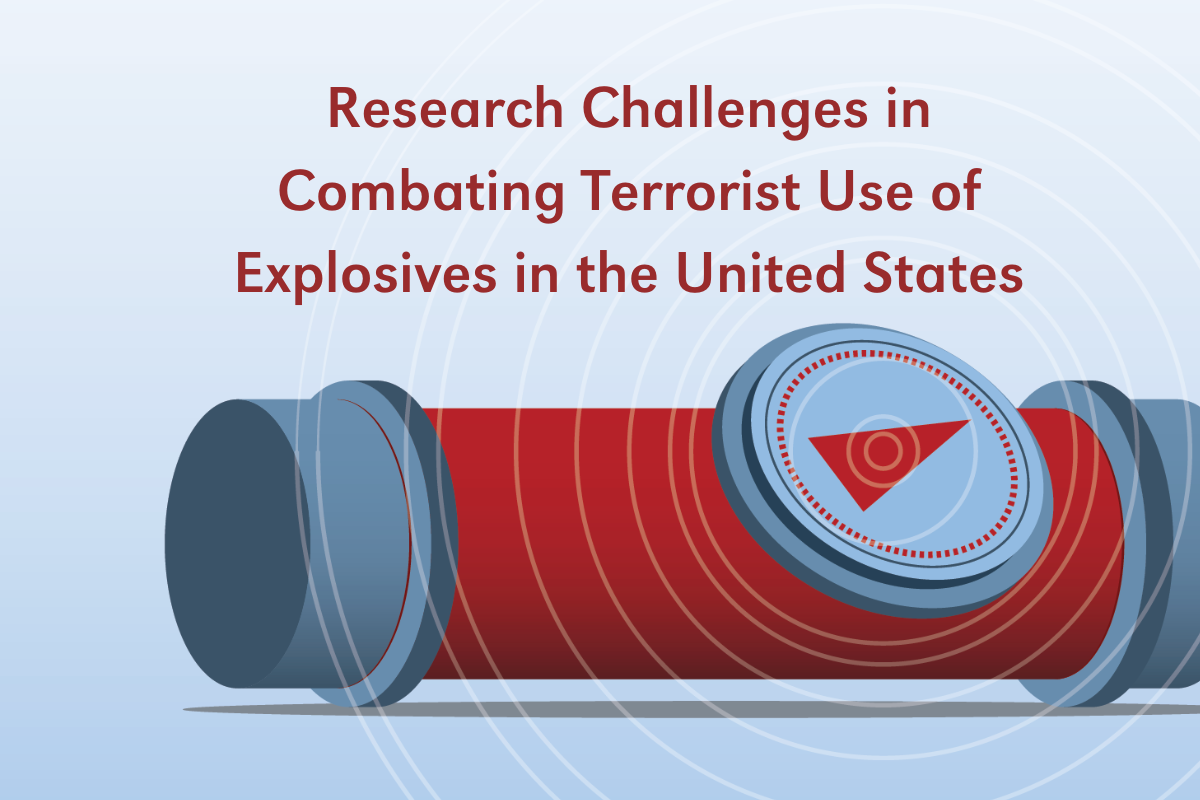NCITE Publishes New Research on Combating Terrorist Use of Explosives
In a new report, NCITE outlines the current terrorist IED threat environment and identifies key priorities for explosives experts – in government, industry, and academia – for preventing and disrupting future attacks.
- published: 2024/07/15
- contact: NCITE Communications
- email: ncite@unomaha.edu
- search keywords:
- improvised explosive device
- terrorism
- national security

At-a-Glance
- Improvised explosive devices (IEDs) are a preferred tool for terrorist actors of all kinds.
- NCITE, based at the University of Nebraska at Omaha, has published a new report outlining key research priorities to support practitioners and policymakers in disrupting the terrorist IED threat.
- Among these priorities:
- Bolstering the security of soft targets, such as event venues and sports stadiums.
- Understanding the threat posed by emerging technologies, including commercial drones, extended reality, and artificial intelligence.
- Developing a stronger system of information sharing between individuals and organizations in the counter-IED mission community.
The terrorist threat in the U.S. has many faces: anti-government actors, violent white supremacists, homegrown jihadists, and a long list of others.
To respond, national security researchers and practitioners need a thorough and current understanding of one weapon that unites them all: The improvised explosive device (IED).
The National Counterterrorism Innovation, Technology, and Education Center (NCITE) has published new research that aims to give them just that. In a new report, Research Challenges in Combating Terrorist Use of Explosives in the United States, NCITE outlines the current terrorist IED threat environment and identifies key priorities for explosives experts – in government, industry, and academia – for preventing and disrupting future attacks.
Terrorists continue to use IEDs because they are relatively easy to make and cause outsized harm to targets, said Austin Doctor, Ph.D., head of counterterrorism research initiatives at NCITE and principal investigator on the IED project. This makes them a particularly dangerous tool in a heightened threat environment.
“The IED threat to homeland security isn’t static. It’s evolving in concerning ways. This is accelerated, in part, by malign use of emerging commercial technologies and the shifting landscape of violent extremism in the U.S.,” Doctor said.
Doctor credited NCITE’s close partnership with the interagency counter-IED mission community with helping the project team identify key challenges around which the scientific community can orient efforts to mitigate the future terrorist IED threat.
“I’m grateful to the Department of Homeland Security for entrusting this important work to NCITE,” Doctor said.
The NCITE publication updates a previous report, published in 2008, that has long served as a landmark resource in the field. To gather information, NCITE hosted a 2023 workshop in Washington, D.C., that brought together some of the nation’s leading minds in explosives and challenged them to work together to identify knowledge gaps in the current understanding of the IED threat.
“This project is a perfect example of the kind of interdisciplinary, timely, and responsive research that NCITE is well positioned to do,” said NCITE Director Gina Ligon, Ph.D. “This fits squarely within our mission to help protect our nation from emerging threats with in-depth academic pursuit.”
The new report outlines 10 critical “grand challenges,” or priorities in which applied science and technology research could most benefit practitioners and policymakers working to disrupt the IED threat. Among these priorities:
- Bolstering the security of soft targets, such as event venues and sport stadiums.
- Understanding how emerging technologies, such as commercial drones, extended reality, and artificial intelligence, may shape terrorist IED attacks.
- Developing a common lexicon and system of information sharing among individuals and organizations in the counter-IED mission community.
The two-year project was funded by the U.S. Department of Homeland Security Science and Technology Directorate (DHS S&T). Within S&T, DHS’s Office of University Programs (OUP) funds Centers of Excellence at colleges and universities around the country, which conduct research to support national security.
NCITE, a Center of Excellence based at the University of Nebraska at Omaha (UNO), holds an agreement with DHS that allows the government to request research that relates to its most pressing needs.
“This report demonstrates the critical role DHS’s Centers of Excellence play in keeping our nation safe,” said Jennifer Foley, deputy director with OUP. “By tapping NCITE’s deep bench of academic expertise, we’ve been able to put together a clearer picture of the current IED threat, giving those tasked with protecting us all from these attacks a critical new tool.”
Throughout the research process, NCITE worked closely with the Office for Bombing Prevention within the Cybersecurity and Infrastructure Security Agency (CISA) which helped ensure the report’s relevance to those working in the counter-IED mission community.
“This research fulfills a critical need for the boots-on-the-ground practitioners who everyday are working to protect our communities from terrorist explosive attacks,” said Jason Stewart, deputy branch chief with the Office for Bombing Prevention. “I know that this report will serve as a key resource for the counter-IED mission community for years to come.”